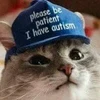Finally started Wisdom of Crowds, the final book in the Age of Madness series by Joe Abercrombie. The series is really good but I'm not sure yet how I'd rank it against his others.
- 57
- 34

Finally started Wisdom of Crowds, the final book in the Age of Madness series by Joe Abercrombie. The series is really good but I'm not sure yet how I'd rank it against his others.
Jump in the discussion.
No email address required.
Jump in the discussion.
No email address required.
Jump in the discussion.
No email address required.
More options
Context
More options
Context
Nothing. !BIPOCs time to shove these neurodivergent mayos back into the locker
Jump in the discussion.
No email address required.
More options
Context
Jump in the discussion.
No email address required.
You’re a light-skinned black?
My whole month is ruined
Jump in the discussion.
No email address required.
We love out lightskin neighbors @PennyKong
@PennyKong
Jump in the discussion.
No email address required.
More options
Context
More options
Context
More options
Context
I can't read
Jump in the discussion.
No email address required.
More options
Context
Intellectuals and society and of course the Holy Quran
Jump in the discussion.
No email address required.
The book begins by providing a historical context for Muhammad's life, discussing the Arabian Peninsula during the time of his birth and the political and social landscape of the region. It then delves into Muhammad's early life, his marriage to Khadija, and his experiences receiving the revelation of the Quran.
Throughout the book, Safi explores Muhammad's teachings and how they continue to impact the world today. He also examines the various interpretations of Muhammad's life and teachings, particularly in the context of contemporary Islamic scholarship and society.
One of the main themes of the book is the idea of Muhammad as a human being, rather than a distant or mythological figure. Safi emphasizes Muhammad's compassion, humility, and commitment to social justice, and argues that these qualities continue to be relevant and important for Muslims today.
Jump in the discussion.
No email address required.
Jump in the discussion.
No email address required.
More options
Context
"Compassion"
Repeatedly raping the nine year old daughter of your successor is compassion?
Jump in the discussion.
No email address required.
More options
Context
More options
Context
More options
Context
I'm still reading that book about Ancient Rome.
I read about how they did elections in the early republic. I guess they'd basically separate people into groups called "centuries" (which maybe used to have 100 people each at some point but that quickly became untrue). Each one got one vote, which was equal to the majority for the group, kinda like how the Electoral College works in the US for presidential elections.
But what they did was when they were doing the census every five years, they'd split people up by wealth. So there were different groups based off wealth. The high-wealth groups had fewer people in them, so the people in those groups had their vote counted "more". Furthermore, the high-wealth groups always voted first, and voting was done to a simple majority, so once 51% voted "yes" or "no", nobody else voted. As a result, the poorest people who voted last (and had their vote diluted the most) often never even had a chance to vote, since the wealthy people at the top had already decisively voted one way or another.
Also all voting had to be done in-person, there were no absentee votes at all. All elections were in Rome so if you lived outside the city you'd have to travel there to vote. Except them you might not even be able to vote because a bunch of people ahead of you voted "yes" or "no" and now your vote doesn't matter and you wasted days traveling for nothing lol.
Kinda based I guess. Neat to learn about too.
Jump in the discussion.
No email address required.
Wow, you must be a JP fan.
Jump in the discussion.
No email address required.
More options
Context
More options
Context
One serious book and one swordshit I liked as a quick read for few evenings and for grammar practice......
and then saw a literally Tumblr level review on popular swordshit literature blog
The serious book - The Satanic Verses by Salman Rushdie
The swordshit book - the justice of kings by Richard Swan
I'll link the review for lulz @peepeekongs
@peepeekongs
Edit/ shows 'connection not secure' so I'm not gonna risk it
I'll copy paste it below
Jump in the discussion.
No email address required.
A lot of people are going to really dig this book. A lot of people are going to find in this the exact sort of thing they read fantasy for, with all the character archetypes and plot twists and cool moments and fantasy worldbuilding they want to see in their stories. For me, however, there are several fundamentals of a good fantasy novel that are missing from this one, and I need to talk about them before I start talking about anything else:
I don't like fantasy books with "man" as the default gender, and The Justice of Kings is very. VERY. full of men. Men who are soldiers, men who are nobles, men as senior political figures, men as religious leaders, men who are fathers or sons (no living mothers here), men as villains and assassins. There are a few women, fewer still who wield any sort of power and aren't there to be mad, servants, or dead. One is an antagonist who plays one specific role and then is never seen again. Yes, the narrator and sort-of protagonist is a woman, but that doesn't excuse the rest of the representation. The most mentioned category of women in this book is "whore" - but, of course, there's no s*x workers with names or dialogue (silly me for even bringing that up as an option!).
Related to 1: I do not like fantasy books which kill off their most interesting or powerful woman to further man pain: a technique known as "fridging". Guess what happens here. Yeah, sorry. Bonus negative points for "dead family" being the entire backstory of a second man as well.
I don't like fantasy books where everyone is cisgender and heterosexual with no mentioned exceptions. In The Justice of Kings, the concept of homosexuality is brought up once, to assure us that the main character is not a homosexual.
I don't like fantasy books where everyone is white. In The Justice of Kings, the existence of people of colour is brought up once, to explain to us that one of the main characters from a specific part of Fantasy Not!Europe is just a bit tanned, not actually a person of colour. As the setting here is very much "conservative backwater frontier of fantasy Not!Europe", I'm more inclined to let this one go from a worldbuilding perspective, because not many people choose to migrate to conservative backwaters. But it's still a choice and I'm still not into it.
I don't like fantasy books without disability representation, and, yay! The Justice of Kings has some on-page disability rep, and includes mobility aids! Sure, they're minor characters, but that means it's not a total wipeout, right? Hmm.
So, uh, what can you do when you've got through a book like this, written on purpose in the year of our Zag 2022? If you're still here, either you're waiting for a comment section so you can explain to me how wrong my criteria are (sorry, we don't have one, but you can go collect a free block on Twitter if you like), or you're wondering why I'm bothering to talk about this book at all. So, let's talk about why I tolerated the above and came out still feeling somewhat entertained, I guess?
The Justice of Kings is, technically, the story of Helena Sedanka, an orphan from a conquered territory who is now a legal clerk to one of the Emperor's Justices, a sort of itinerant lawyer/judge/executioner. Helena's narration is told as a memoir, as she looks back on the events from the perspective of an old woman and occasionally gives ominous proclamations about how bad things are going to get, and significantly more charming proclamations about how dense her nineteen-year-old self is. Helena's account is dry, and it takes time for her to open up about herself or talk about the emotional state of other characters, and its through this style of narration that we get to know the real star of the show (and the front cover): Sir Konrad Vonvalt.
(Adri, you read a book with a protagonist called "Sir Konrad Vonvalt" and you were SURPRISED you got almost zero diversity? Yeah, look, I already said mistakes were made. I'll know better next time.)
Sir Konrad, as Emperor's Justice, is tasked with wandering around mainly in the frontiers of the Empire - territories it often just finished conquering a couple of decades ago, in the "Reichskrieg" war - and dispensing justice according to the Empire's Common Law system. With the weight of the emperor's authority, Vonvalt is empowered to hand down sentences from one penny fines up to and including death, with the only real oversight being his own conscience and his accountability to the Order of Justices. As part of his training, he has access to two magical arts, one which allows him to compel the truth from anyone he asks a question of, and one which allows him to speak to the dead, though both come with a high price tag. He's also a talented swordfighter. And handsome! At the point we first meet him, Vonvalt is portrayed as a fair and upstanding person, willing to overlook the letter of the law if he can dispense justice with a minimum of bloodshed. By the end of the book's events, he's done a lot more sword-waggling than fine-levying, and Helena's ominous older self makes it clear that that's the trajectory of things to come.
With its magistrate protagonist, The Justice of Kings wants to be taken seriously as a story of political upheaval through the lens of order and justice. My expectations when it comes to stories dealing with the rule of law are super high, particularly when it comes to administration of colonised places, but I think this story hits a lot of the right notes even if there's a lot more to be explored. There's a lot of showing how the law is inconsistently applied, particularly when it bumps up against the military strength of the church and local nobility, but we see less discussion of the enforcement of "Common Law" as a whole, and how that works in places recently acquired by an expansionist, assimilationist empire.
In particular, we never see Vonvalt or Helena really grapple with the implications of legal events of Rill, the first location in the book, where Vonvalt uncovers widespread "draedism" (i.e. religious heresy), and goes to great lengths to avoid having to record it as a serious crime, instead levying minor fines for villagers to "renounce" their heresy and avoiding any major charges towards the Lord and Lady who are clearly also involved in the old religion. It's transparently the right thing to do: the reader knows it, all the characters except the shitty Empire religious leader know it, and the village itself is reluctantly grateful for being given just enough room to back down without total capitulation. But it's a case of Vonvalt bending the law as far as it will go to ensure justice, and it gives rise to a lot of questions about just how fair and universal this Empire's common law is, and also how far Vonvalt really deserves the characterisation of "upstanding lawman guided by impartial justice and not by his own whims" at the start of the book, and calls into question how much he really changes over the course of events. Of course, we only have Helena's analysis that he has changed, and while her narration is dry and detached in a way that makes it feel trustworthy overall, there's also a strong sense that her judgement around Vonvalt isn't exactly... unbiased. If there are aspects of Vonvalt's behaviour that are being de-emphasised or glossed over in Helena's chronicle, that sets the series up for some interesting potential twists later, but for now that's just one potential direction in a series that's still, as of the end of this book, setting the scene.
Am I going to be back to see this play out? See points 1 - 5 above: that is to say, probably not. Life's too short to read annoying books, and while I see a ton of potential in The Justice of Kings, I just don't think anyone in 2022 writes about this many straight white dudes by accident, you know? I'm sad to have to let go of a series with such an intriguing focus on law, but I'm sure there will be plenty more to pique my interest, and I won't have to play "mad, dead or unimportant" bingo with the handful of women in them.
Jump in the discussion.
No email address required.
thanks I'm gonna get the book.
Jump in the discussion.
No email address required.
More options
Context
Negative reviews full of stupid criticisms always make me want to read the book
Jump in the discussion.
No email address required.
I've read most of the book before I found this review.
It's quite clear that this reviewer wants to read some Mary Sue fanfiction or one about self flagellation.
Jump in the discussion.
No email address required.
More options
Context
More options
Context
The author of this review
[Ai.jpg]
Jump in the discussion.
No email address required.
More options
Context
Darn, you're really mad over this, but thanks for the effort you put into typing that all out! Sadly I won't read it all.
Jump in the discussion.
No email address required.
She really was mad about the book
Jump in the discussion.
No email address required.
More options
Context
More options
Context
More options
Context
More options
Context
Almost finished with Anna Karenina, just been too busy to binge to the end. Lovely read.
Jump in the discussion.
No email address required.
She commits suicide by throwing herself under a train at the end. Funniest shit ever.
Jump in the discussion.
No email address required.
More options
Context
More options
Context
Jump in the discussion.
No email address required.
More options
Context
I’m going to pick up The Man Who Was Thursday later this week
Jump in the discussion.
No email address required.
More options
Context
I am still reading Crucible of War. Has to have been about a month now and I'm about halfway through. I don't get to read as much as I would like
Jump in the discussion.
No email address required.
More options
Context
A People's History of the World by Chris Harman, it's very good and his discriptions of pre/early class society were very interesting. I think he's a bit too harsh on Christianity, I knew I was in for it when I heard "dark ages" instead of middle/medieval but it is a book from 1999 so being a Hichens-like atheist was just on the rise. When he gets to World War 2 it just devolves into Trotskyist nonsense, it was sprikled through out the book but it is overwhelming at the end.
8/10 for being dated and Trotskyist shite
Jump in the discussion.
No email address required.
More options
Context
2666 - Bolano
Jump in the discussion.
No email address required.
I can't remember if I loved this book or I just loved the cover. It was like 800,000 pages long, I do remember that
Jump in the discussion.
No email address required.
It really has a beautiful cover.
cover.
Jump in the discussion.
No email address required.
More options
Context
More options
Context
More options
Context
How to Write One Song by Jeff Tweedy of Wilco. Please let this jump start me and cure this malaise in my brain


Jump in the discussion.
No email address required.
is tweedy of his middle name
Jump in the discussion.
No email address required.
More options
Context
More options
Context
Jump in the discussion.
No email address required.
More options
Context
Almost done with The Hobbit.
I’m about to start some of the other fantasy recs I’ve gotten here. So far I’m thinking First Law, The Sword of Truth, and this series with cavemen whose name I forget.
Jump in the discussion.
No email address required.
More options
Context
I read The Travelling Cat Chronicles and it was really good, makes me wish kind critters could talk.
Jump in the discussion.
No email address required.
More options
Context
"the wall" by Jean-Paul sartre. Just a bunch of short stories but I really like it so far. Going to read Nausea next
Jump in the discussion.
No email address required.
More options
Context
War Against the Schools Academic Child Abuse. It was written in 1992 and point chapter criticizes the rollout of the Whole Language method of reading instruction which recently has had a bunch of articles written about it showing how ineffective it is.
Jump in the discussion.
No email address required.
More options
Context
rereading my favorite book, A Little Life. it’s horribly depressing but such a beautiful story, and has some of my favorite quotes ever. i’ve never been able to relate to a character more than I have with this book. I could talk about it for AGES
This is probably my favorite passage: an elderly father talks about his son who has recently passed in a letter to the son’s partner:
“But although I could never have imagined the person he would become for me, I knew how he would leave me: despite all my hopes, and pleas, and insinuations, and threats, and magical thoughts, I knew…Had we missed something? Could we have done something different?…That he died so alone is more than I can think of; that he died thinking he owed us an apology is worse; that he died still stubbornly believing everything he was taught about himself- after you, after me, after all of us who loved him- makes me think that my life has been a failure after all, that I have failed at the one thing that counted…It isn’t only that he died, or how he died; it is what he died believing. And so I try to be kind to everything I see, and in everything I see, I see him.”
Jump in the discussion.
No email address required.
At no point in your rambling, incoherent post were you even close to anything that could be considered a rational thought. Everyone on this site is now dumber for having read it. May God have mercy on your soul.
Jump in the discussion.
No email address required.
More options
Context
More options
Context
Propaganda by Edward Bernays
Jump in the discussion.
No email address required.
More options
Context
This https://learn.microsoft.com/en-gb/training/?WT.mc_id=learnaka
Jump in the discussion.
No email address required.
More options
Context
I finished reading
reading  the Footprint of Mussolini. It's a really great
the Footprint of Mussolini. It's a really great  alt history
alt history  novel
novel  about Fasicst Italy
about Fasicst Italy  turning on Nazi
turning on Nazi  Germany
Germany  and being a power
and being a power  through the cold
through the cold  war. The Henry Wallace
war. The Henry Wallace  arc is brutal
arc is brutal  but very good.
but very good.
Jump in the discussion.
No email address required.
More options
Context
hymns of the republic by s c gwynne
Jump in the discussion.
No email address required.
More options
Context
The Wandering Inn, slice-of-life epic fantasy, is still my main read. I'll give anyone a Kindle/audiobook code.
Secret Journey to Planet Serpo. I try to read a good schizo book every now and then. This is about a military exchange program with aliens.
What the Buddha Taught. Very good intro to Buddhism philosophy.
Jump in the discussion.
No email address required.
aren't slice of life and epic opposites
Jump in the discussion.
No email address required.
it seems like a web novel that takes the piss out of fantasy tropes.
trans women are women
Jump in the discussion.
No email address required.
More options
Context
It's 12 million words at the moment. Slow burn but worth it.
Author is the #2 author on Patreon and I endlessly simp.
Jump in the discussion.
No email address required.
More options
Context
More options
Context
More options
Context
mein kampf
Jump in the discussion.
No email address required.
More options
Context
lmao
Jump in the discussion.
No email address required.
Just seems like an r-slured schizo to me tbh
Jump in the discussion.
No email address required.
More options
Context
More options
Context